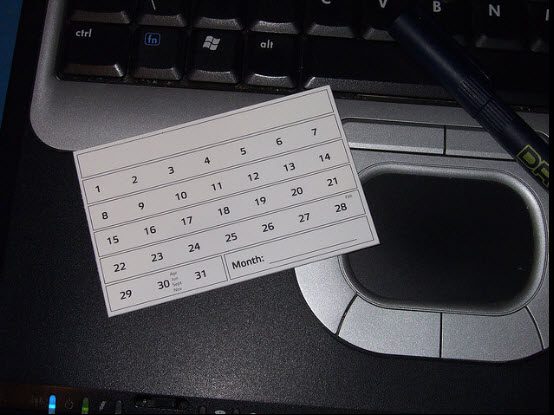The Dos And Don’ts Of Planning Your Day
By David
August 27, 2013 • Fact checked by Dumb Little Man

Planning is tricky.
Eric wants to be a pro golfer. He reads articles on swing technique, he watches the pros and takes notes, and he researches courses and equipment. He does these things all day, every day. See a problem?
Eric never plays golf! He plans extensively in preparation for playing golf, but he doesn’t practice like he needs to do. Eric won’t win any championships because – like many things in life – golf can only be learned by doing.
Who isn’t guilty of planning to do something great and never doing it? The reason is poor planning habits. To find the path to any objective requires excellent planning, so read on for the dos and don’ts of planning your day.
Do Plan Like This
Planning is like yoga – you want to put yourself in specific positions, but remain flexible. For example, you can plan to mow the lawn at 3:00 PM today, but if a tornado passes through your yard at 3:00 PM and ruins your initial plan, does that mean you can’t mow the lawn? Well, yes, because your lawn would be in shambles. But otherwise – if the tornado didn’t destroy my example – there would be no reason to not mow at 3:15 PM.
1. Do identify specific triggers because it’s what the brain understands and it leads to action. You can’t mow your lawn in general, you can only do it at a specific time of day. So when you plan to “mow the lawn tomorrow,” your lack of specificity decreases your chances of actually doing it. If you’re thinking, “Yeah, but I’d still do it,” then you’re missing the point, which is that not all plans are as easy as mowing the lawn, and every “small” plan sets a precedent for the bigger plans. Make your trivial planning excellent and your big plans will follow suit. Trivial plans are what give you poor or excellent planning habits.
Skills that benefit specificity: organization, focus, ambition, awareness, attention-to-detail
2. Do have flexibility – it lets you execute your plans even when “life happens.” This is plan B, and you can either decide on it ahead of time or plan to improvise. Each strategy has its merits and situations of ideal use. Planning ahead has the benefit of greater security in doing something, while improvising comes with the perk of reacting appropriately in the exact situation. My preferred method of planning is a plan B with room to improvise (or several backup plans based on what’s expected).
Skills that improve flexibility: persistence, determination, confidence, courage, improvisation
Together, specificity and flexibility can conquer galaxies many things.
Don’t Make These Three Planning Mistakes
1. Don’t plan uncontrollable activities. “Getting a book deal” is not a plan because it isn’t your choice; it’s a desired objective. Don’t include it in your plans or you’ll stall because it’s not something you can control. You can only control actions like writing or pitching your book.
2. Don’t mentally cycle through ideas and fail to write them down. This is a common, big problem. Ideas are wonderful things, but they can be distracting productivity killers too. Ideas are like wild animals that you need to wrestle down to control, and writing them down is how you do that.
Poor planners have a habit of cycling through ideas repeatedly because the mind can’t hold more than a few things in mind at once; with 30 ideas, each idea will have the spotlight for a few minutes. The brain can’t compare 30 ideas effectively – it will struggle just to remember them all! This is why many people don’t take action, because their planning stage is an infinite loop of ideas.
3. Don’t let perfectionism delay important tasks. The best time to work on your project is right now. Poor planners have a misconception that the future is a more ideal time to work on something because there are always excuses not to do it in the present moment (low energy, not in the mood, imperfect finances, etc.). But when tomorrow comes, imperfections of the present moment are noticed and the cycle continues, and plans are pushed back continuously.
Perfectionism prevents important tasks from being accomplished, and it damages a person’s trust in their ability to execute a plan (bad news). Start when something is good enough, and promise yourself you’ll worry about greatness later.
How To Plan Recap
Make your plans specific and within reach, like this…
“I’m going to run 2.37 miles at Jetton Park at 4:18 PM tomorrow.”
That plan is so specific that you can envision exactly what it will look like when it happens. If you don’t want to time your day out to the minute, use a delayed trigger such as, “one hour after I eat lunch, I’ll drive to Jetton Park to run 2.37 miles.” Or if you know you’ll be doing another task, you can say, “after I write the post on planning, I’m going to eat four gallons of ice cream.”
Also…
1. Focus on things you can control
2. Write ideas down to get them out of your head
3. Shun perfectionism in favor of doing-somethingism.
If you liked this post and are interested in 40 custom focus wallpapers (with quotes and pictures), please join us at Deep Existence, where we focus on focusing! 🙂 I combine behavioral science, psychology, intuition, and self-experimentation to help people get focused in our distracted world. Click here to learn more and claim your wallpaper set.
Cheers,
Stephen Guise
 |
Written on 8/27/2013 by Stephen Guise. Besides writing for his own blogs Stephen is a featured writer here at Dumb Little Man. Be sure to stop by Stephen’s ‘featured writer page‘ right here on Dumb Little Man to find links to more of his articles. |
Photo Credit: Joe Lanman


